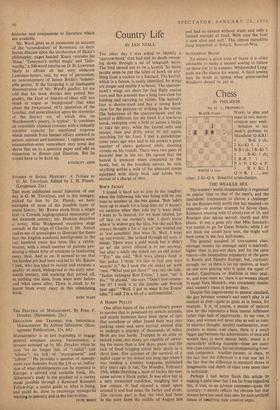THE most celebrated social historian • of our day is
G. M. Trevelyan, and in this nosegay, picked for him by Dr. Plumb, we have examples of most of the possible types of social history. Mr. Rowse starts from a single text—a Cornish hagiographical manuscript of the sixteenth century; Mr. Hoskins describes a town; Miss Wedgwood examines stage comedy in the reign of Charles I; Mr. Annan makes use of genealogies to illustrate the thesis that the English academic intelligentsia in the last hundred years has been like a rabbit- warren, with a small number of parents pro- ducing a whole tribe of relations (a fascinating essay, this). And so on. It seemed to me that the hardest job had been tackled by Mr. Kitson Clark, who has tried to isolate and examine a quality of mind, widespread in the early nine- teenth century, and marking that period off, as nothing else does, from what went before and what came after. There is much to be learnt from every essay in this stimulating book.
JOHN WAIN


































 Previous page
Previous page